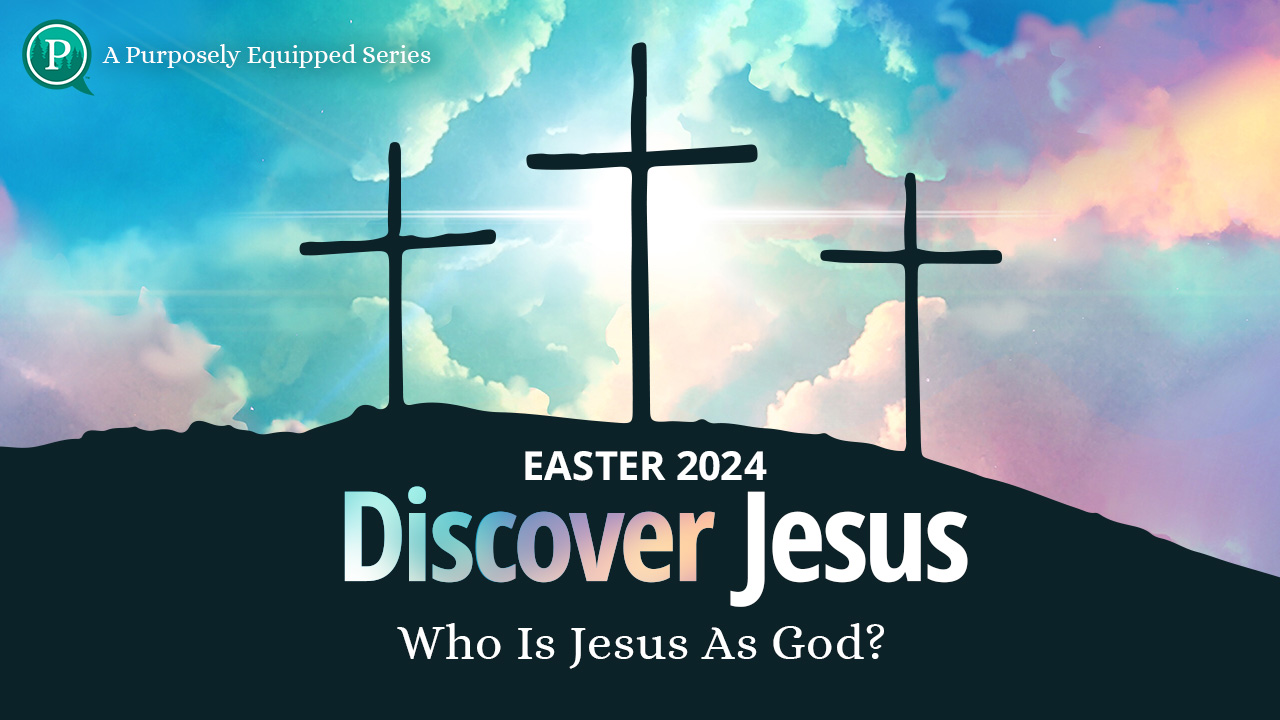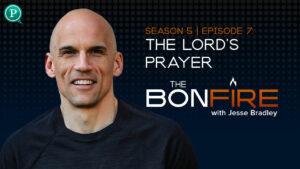On episode 2 of our series Discover Jesus, Mark Holland and Pastor Michael Martin of Immanuel Bible Church discuss the question, “Who is Jesus as God?” They delve into the mysteries of Jesus and his attributes, the concept of the Trinity, and the importance of Jesus being God. They also discuss Jesus’ miracles, teachings, and his acceptance of worship, all of which point to his divinity. Pastor Martin emphasizes that Jesus, as God, died for sinners and offers forgiveness and eternal life to those who repent and believe in him.
Show Notes:
Transcription:
Mark Holland:
“When I consider your heavens, the work of your fingers, the moon and the stars which you have set in place, what is mankind that you are mindful of them. Human beings, that you care for them.” This excerpt from Psalm 8 helps us put into perspective how wonderful and mighty God is. There are so many mysteries to uncover about Jesus, and how his attributes affect our daily life.
On this episode, we will unpack the question, Who is Jesus as God? With Pastor Michael Martin of Immanuel Bible Church in Bellingham. Purposely Equipped series, Discover Jesus, another episode, and another pastor that we are zooming in from Bellingham actually today, a lot of our praise listeners who might be familiar with Immanuel Bible Church there in Bellingham, we have Pastor Michael Martin with us. Hi, pastor.
Michael Martin:
Hey, good morning.
Mark Holland:
Good to see you. And we are seeing each other on Zoom, and took us a while to get connected, and everybody’s running around trying to make things work, but we got it.
Michael Martin:
That’s right. It’s good to be here.
Mark Holland:
Yeah. This first time that you’ve done a podcast?
Michael Martin:
Yes, it is.
Mark Holland:
Okay. Well, I haven’t done a whole lot, a few, and we were going to be getting into the second in our episodes on Who is Jesus as God. So I guess you’re going to put on the brain cap today, and get into this-
Michael Martin:
Yeah, that’s right. You jump in the deep end when you do your first one, so that’s where I am today.
Mark Holland:
[inaudible 00:01:37] into the deep end you go. We will, in just a moment, talk more about that. Tell us a little bit more about yourself and Immanuel Bible Church.
Michael Martin:
Yeah, yeah. I am the pastor at Immanuel Bible Church, in my fourth year here. I came from a pastorate on the East Coast, and my family and I moved out in 2019, and that was just a few months before COVID came, so we experienced ministering in a unique way, as so many did in those early times here. But we loved this church, we love this community, and we are excited about what God is doing in this local church right here in Bellingham.
Mark Holland:
Well, Bellingham, a beautiful town. I don’t get up there too much, but I know it’s quite a college town, with Western University there. Do you have a lot of Western students who come to your church?
Michael Martin:
We don’t have a lot of Western students, but we, in recent years, have decided we’re going to go to them. And we’ve really made strides in our face-to-face evangelism, we’re going on campus, we’re sharing the gospel, and we hope one day to see more Western students as that seed plant and as it sprouts.
Mark Holland:
Okay. Well, real vital town, love Bellingham, and I love this series, Discover Jesus, obviously airing this during the Easter season, taking on some of the deeper questions about Easter. Easter, probably more important to the Christian faith even than Christmas, don’t you think?
Michael Martin:
I do. I agree with that.
Mark Holland:
Yeah. Yeah, it’s central to our faith. And you’re taking on the question of, who is Jesus as God? Now, this is a big question, a real stumbling block for a lot of people as they consider the Christian faith. They think Jesus was a good moral teacher, but Jesus is God, I mean, give me a break. They don’t go for that. So set this up for us, why is this so important to the Easter story?
Michael Martin:
Yeah, I think it’s critical to understand that Jesus is God, because the Bible sets that truth forth in what, I would say, are very clear ways. I think it’s a familiar truth to Christians. Of course, Jesus is God, we almost take it for granted. We understand that, but as you mentioned, even within Judaism, they do not come that far in believing that Jesus is God, and Jesus has made this clear in some more subtle ways. He would perhaps be teaching, and preaching, and apply a prophecy to himself, or he would change a word in an Old Testament verse to apply it to himself. So there’s some subtle ways that he’s done that, and then there’s some ways that are going to be more bold and more clear in how he’s done that. But I think it’s imperative that we understand that Jesus is God, and as God, he is to be worshiped.
Mark Holland:
Well, what do you think are the differences between the idea of Jesus as God, and Jesus as messiah? Were those two different roles, or how are they those closely aligned, do you think?
Michael Martin:
I think that when we say Jesus is the messiah, we are saying that he is that anointed one promised by God to come and save us from our sins. Only God, only a perfect God, can give a perfect sacrifice. So Jesus needed to be God, the messiah needed to be God to give that perfect sacrifice. As we all know, none of us are perfect, and on our best days we’re not close. So we needed the messiah to be perfect, and Jesus is that perfect Messiah.
Mark Holland:
But they weren’t looking for a messiah to be a sacrifice for people’s sins, they were looking for him to be more of a political leader, don’t you think?
Michael Martin:
Right. I do. I do, I think that that’s an important truth to remember as we read the gospels, we assume things about the messiah from 2024, but when he was doing ministry, they were looking for someone to kick Rome out. And even that grand entry into Jerusalem, the shouts of Hosanna, I think in the minds of many of those people, they were looking for a particular kind of messiah, and Jesus turned out to be so much more.
Mark Holland:
Well, you say Jesus made this claim of being God subtly, and more boldly, and you’ve got a scripture reference here, John 10:30. Do you have that reference in front of you?
Michael Martin:
Oh, I do. Yeah. Yeah, a portion of that, Jesus says… Quite frankly, he says, “I and the Father are one.” That made those religious leaders really mad. They were the intelligentsia of their day. They understood that to be a claim to deity, and they picked up stones to stone him, to kill him. And that’s an indicator then, if the religious leaders of the day who knew a lot about religion, a lot about God, if they were hearing what Jesus was saying and responding in that way, that’s a strong evidence of his deity.
Mark Holland:
Yeah, “Before Abraham was, I am.” He said it that way too. Ego on me, that I am, and God and I are one. This bothers both Jewish people and Muslims, this idea that Jesus could be God, because God is one. I don’t know how much you want to get into the whole idea of the Trinity, but what is the distinction there between Jesus as God, and Jesus as part of the Godhead?
Michael Martin:
Yeah, that is a difficult concept as far as the Trinity is concerned. I feel like when we come to the Trinity as a doctrine in the Christian faith, we can go so far with it, and at some point we have to do what we always do as Christians and just follow the Lord in faith, and say, “This is as far as I can go in understanding the depth of what this means.” We have good scholars and good history in the Protestant tradition who’ve written on this, but at some point, we have to say, “Listen, Jesus, you are God, I believe that much about you, and I can go as far as I can in understanding that, and-”
Mark Holland:
Right.
Michael Martin:
“What I don’t, I believe in faith. I trust you.”
Mark Holland:
Yeah, the Bible doesn’t use the word trinity really anywhere, but the idea of this God being plural is throughout the scripture. Even in the first chapter of Genesis, it says, “Let us make man in our image.” And I’ve heard people kind of puzzle over that scripture, because, “Well, God has very bad grammar here. Why is he using this plurality to describe himself?” But even right there at the beginning of the Bible, we believe as Christians that that’s a reference to the Trinity.
Michael Martin:
Yeah. Yeah, “Let us make man in our image.” The Bible insists that there is three, three individuals, three persons in one, but at the same time, the Bible insists that there is one God. And we’re trying to reconcile those things in our finite minds, and we do as best we can.
Mark Holland:
Yeah, I heard even an interesting arithmetic equation, people go, “Obviously 1 + 1 + 1 = 3, so God is one, so how does that work?” But I heard that that’s not the equation, it’s not 1 + 1 + 1, it’s 1 X 1 X 1 = 1. And I’ve always found that helpful to understand the Trinity. But you’re right, this is kind of heavy stuff, it’s hard to understand it, but getting back to Jesus as God, Jesus had to be God because of the incredible miracles he performed. You’ve actually done a study on this, how many miracles were there that Jesus did?
Michael Martin:
Yeah, yeah. Depending upon how you count them, and you put the gospels together, you harmonize them, there’s recorded miracles in the gospels. And I also say that that’s on the low end.
Mark Holland:
Yeah.
Michael Martin:
When you get to the end of John’s Gospel, he writes, “There’s many other things which Jesus did.” And I think that’s such a phenomenal statement, and his gospel with. I mean, that gets the years going, doesn’t it?
Mark Holland:
Yeah.
Michael Martin:
We’re left wondering, “Who is this amazing God?” We’ve read of some of these miracles in John’s Gospel and in the other three, but there’s more out there, and we know that there’s more that Jesus did ’cause John says that.
Mark Holland:
Yeah, there was a point to all his miracles, again, to show his deity. Tell us a little bit about why miracles, do you think? Was it mainly just to show that he was the Lord, or…
Michael Martin:
Yeah, I think that is certainly a leading reason. I think he did it for a few reasons, I’d say for sure Jesus loved people, Jesus had compassion on people. Many of his miracles in fact were healings, in that vein, it showed he had authority over disease and over sickness, but we know there’s other types of miracles. He showed his authority over nature, he stilled the storm on the sea of Galilee, he showed his authority over the spiritual realm, he exorcized demons, and he showed his authority over death, he raised the daughter of a soldier. So there are many different ways that he showed that he was Lord, Lord over nature and realm, spiritual realm, and over death, and most of all, he did this through his miracles.
Mark Holland:
Well, not only did he perform miracles, but he obviously had masterful teaching that we hold on to today. Even people who don’t believe in Jesus as messiah can acknowledge that he was a wonderful teacher, and that Western civilization in many ways is based on his teachings, or tries to be anyway. Give us a little bit of an overview of some of Jesus’ teaching.
Michael Martin:
Yeah. Yeah, I think in terms of his teaching, he was the history’s most profound, and simple, and practical teacher to ever live. As you mentioned, even people who don’t know Christ, they know his teachings. They know about the prodigal son, or about the good Samaritan. I love the story early in the Gospel of Luke, Luke records a portion of his childhood in Luke 2. Jesus is with his family in Jerusalem for a feast, and his parents leave, and realize that he’s not with them. So three days later, they’re back, and they find him… Where do they find him? Sitting in the midst of the teachers. And these were temple teachers, these were teachers who really knew their stuff, we’d call them the valedictorians of their day. And the Bible says all who heard him were amazed at his understanding and his answers.
And just to put that in perspective, this is Jesus at age 12, this is sixth grade in our day. This is like a boy or a girl in a middle school standing before a science class filled with teachers, and giving a lesson on molecular biology, and nailing it.
Mark Holland:
Yeah.
Michael Martin:
It’s amazing what he knew, and that’s just from a young age.
Mark Holland:
Yeah. Then obviously moving into his older time, but his teaching wasn’t necessarily accepted in his hometown. Tell us about that.
Michael Martin:
Yeah. Yeah, I think that has to be one of the hardest places to win over your audience, is those people who knew you growing up, knew you from childhood, and they’re even in his hometown synagogue, he goes in, and his teaching creates a stir, “Where did this man get this wisdom and these miraculous powers?” They ask. And that means that even the Smiths or the Joneses, or whoever, grew up the street from Jesus, they even acknowledged the wisdom of his message.
Mark Holland:
He taught even his enemies.
Michael Martin:
Yeah. Yeah, that’s remarkable too, that he left his enemies amazed at his teaching. His teaching in many ways becomes a defense, but he had a way of even turning that around to give instruction. And the Pharisees, who weren’t doing such a good job as religious leaders in their day, they’re trying to trick him about paying taxes, and in the end, the account concludes that they were amazed at him. And I would say, again, that not only does he have rich content in his teaching, he’s serving up meaty doctrine, but he never got caught in that check meter, or even in check. He had a way of turning those arguments around, and using them as launching pads for instruction. He was a masterful teacher.
Mark Holland:
The favorite story of mine is when that woman caught an adultery, and they were standing around asking, “What should we do? Should we stone her?” And he said, “Well, whoever among you is without sin can cast the first stone.” I mean, that was just a masterful turn.
Michael Martin:
Yeah. It is. And he could say that, he could wrap it up in one statement that just made the crowd quiet, and pondering what he said.
Mark Holland:
So many great teachings of Jesus. And as we move toward Easter, and we’re in the Easter season, a couple of moments surrounding his death and resurrection, why don’t you give us an example of how he received worship on Palm Sunday?
Michael Martin:
Yeah. Yeah, I think we mentioned this in part already, people saw his miracles, and they heard his teachings, and they worshiped him. And more than that, Jesus accepted that worship. And Palm Sunday was that day he rode in to Jerusalem, the people shout Hosanna. That word is jam-packed with meaning, I mean, to be sure, it is a word of praise, but the words build off of two Old Testament Hebrew words. And when you put them together, it means, save us, we pray, or save us, we beg. And that’s an exclamation, and that fanfare, that’s worship. And I realized, we can see that they had a certain messiah in mind that day, but some people knew as well that this was more than just a deliverer, in terms of physical deliverance here on Earth, there’s something more to this man, he is a God man.
Mark Holland:
Yeah. So many things to be unwrapped about the Easter weekend, the Passion of Christ, as we call it. But let’s move on to where he was resurrected, and an example that Jesus is God with Doubting Thomas. How did that go?
Michael Martin:
Yeah. Yeah, Doubting Thomas, I kind of feel bad for the guy, so many other disciples earned nicknames that should have stayed with them through history, we can think of ones we would’ve given to Peter. But poor Thomas, his nickname stuck. But at the same time, we really need to commend his faith. It was delayed, to be sure, all of us can identify with that, we wish we had more faith right away in many instances in life. But Thomas did realize that Jesus was resurrected, and he exclaimed, “My Lord and my God.” One of those wonderful lines near the end of John. And again, those are words reserved for divinity.
Mark Holland:
Yeah.
Michael Martin:
And then as was his pattern, Jesus didn’t discourage that, he didn’t correct Thomas, he accepted worship.
Mark Holland:
Yeah. “Here I am, Thomas, put your hands into my hands to see the nails.”
“Are there nail scars?” And he wasn’t afraid of questions, even from doubters like Thomas. So many things to recommend Jesus as God, as messiah, and as someone who is worthy of putting your trust in, and we would even say worship. That’s something that’s very different about Christianity from other religions, is the central person of Christianity, obviously is Jesus. It’s not his teaching, it’s not his miracles, it’s Jesus. What do you think of Jesus, and Jesus is central. So as people are listening to this, considering the claims of Christ this Easter season, maybe they’ve been away from church, listening to this podcast, why don’t you give people an invitation to believe the gospel?
Michael Martin:
Yeah. Yeah, Jesus made us to worship, God made us to worship. We can’t help but worship. And it was Augustine, an early theologian in the church, he said, “You have made us for yourself, oh Lord, and our heart is restless until it rests in you.” And again, God has created you, if you’re listening, and he made you to worship him. We sin, we break God’s law, and we find ourselves worshiping all kinds of things, but at Easter, we celebrate the death and resurrection of Jesus. And he is God, he died for sinners, and those who repent from sin and believe in him, they’re going to be forgiven, and they’ll spend eternity in heaven with Jesus.
Mark Holland:
Well, let’s pray. Let’s pray right now for somebody who’s listening. Why don’t you lead us in a prayer for somebody who has been thinking about that, been listening to this, and who knows? Maybe already are convinced, and they know they need to put their trust in Christ. Why don’t you pray for those people?
Michael Martin:
Yeah. Lord Jesus, thank you so much for this resurrection season. Thank you for this time of year when we remember that you died for our sins and you rose again. I pray for those who are considering, considering you, or, “Are you God?” Are you able to redeem them? Are you able to forgive them? Lord, I pray that you would meet them where they are today, that you would grant faith, and you would call many to yourself. Oh Lord, we pray these things in your name. Amen.
Mark Holland:
Amen. Again, talking with Pastor Michael Martin of Immanuel Bible Church in Bellingham. Thank you so much for participating in this Discover Jesus podcast, Michael.
Michael Martin:
Yep. Thank you.
Mark Holland:
And thank you so much for listening to Purposely Equipped. We hope that you gain a deeper understanding, and discover who Jesus is this Easter season. Invite a friend to listen too, and we’d love you to leave a review, so more people can find this podcast. Special thanks again for our guest pastor, Michael Martin of Immanuel Bible Church in Bellingham. We’ll see you next week for the discussions of What Hope Does the Death and Resurrection Offer Us? And Why Did Jesus Have to go to the Cross? With Pastor Jesse Bradley of Grace Community Church in Auburn.







